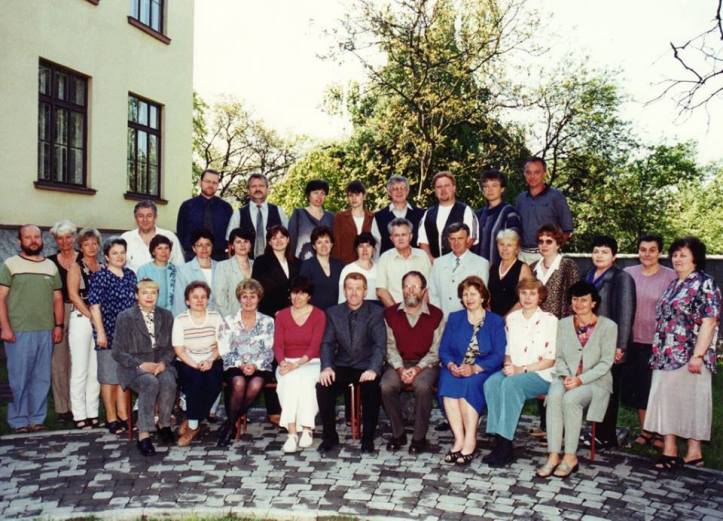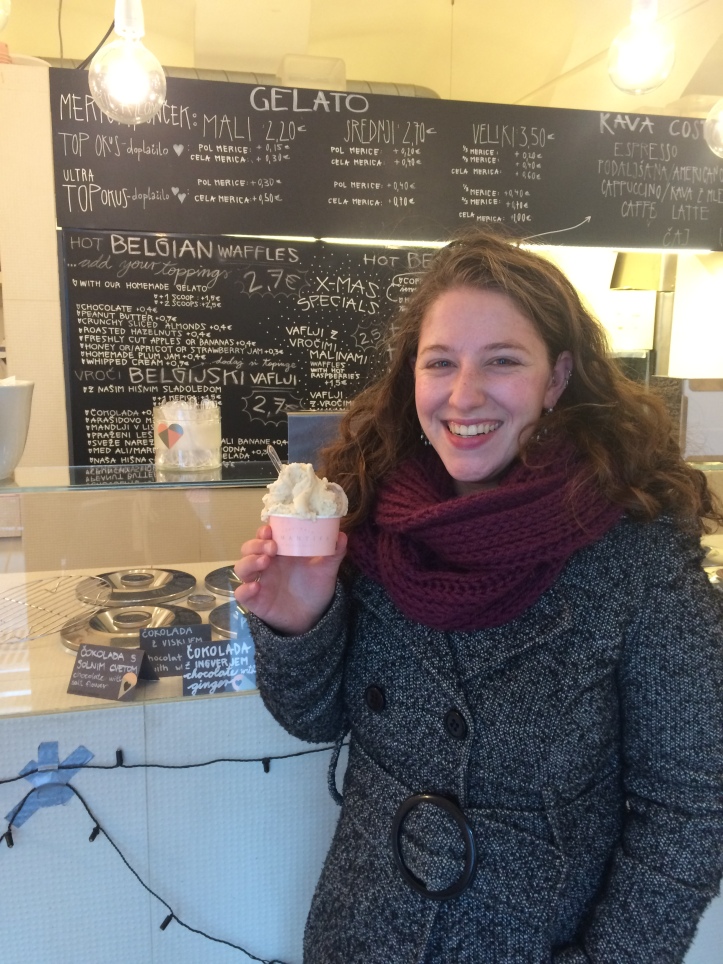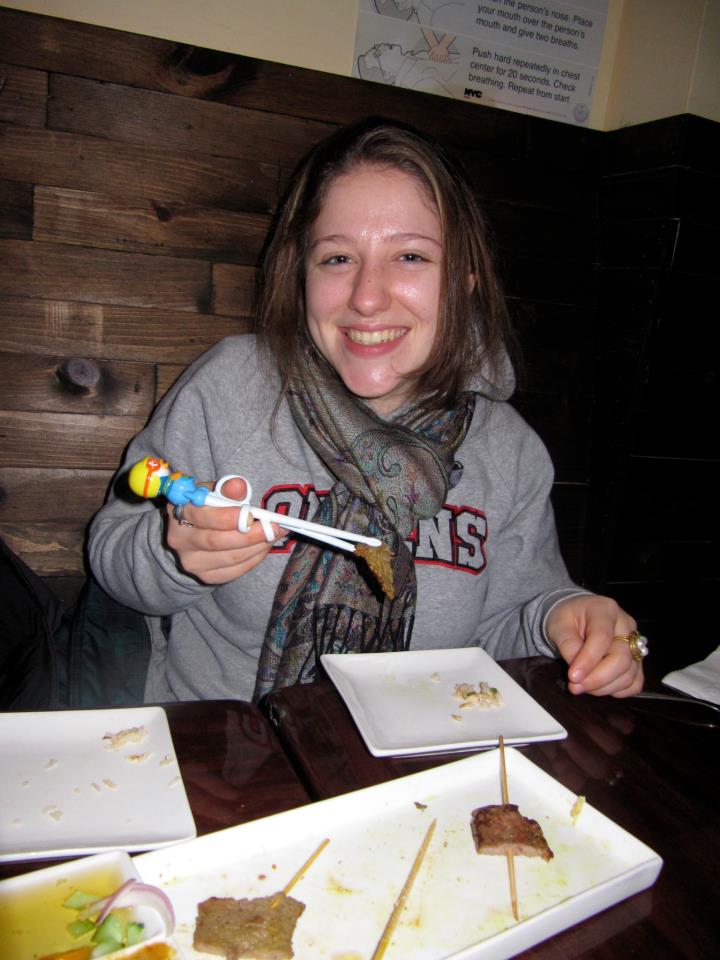Czech – like English, and I’m sure like many other languages – has some very nice phrases for referring to cultural oddities. Some Czechspressions, for example:
“It’s a Spanish village to me” (Je to pro mne španĕlská vesnice) = “It’s all Greek to me” = I don’t understand it even a bit. (They would also say it’s “Chinese” rather than “Greek”)
“Once in a Hungarian year” (Jednou za uherský rok) = “Once in a blue moon” = only once in a while
“Swedish table” (švedský stůl) = buffet
But a very literal Czechspression that I learned today is “americký usměv,” and we all know what that is. (Unlike “American potatoes,” which are always on Czech menus and I have no idea what those are.)
The pictures above show exactly how this mysterious “American smile” was shown to me by my Czech friends. This is a huge contrast from the Czech (and Slovak) not-smile, which is actually quite agreed upon (here and here, Czech only). And it’s true, it’s funny to look at these photos as an American, because people look so stoic. However, it’s just not the custom, mostly now of older generations but also some young people, to smile in photos.

I’m being a bit selective, but here’s how the first link puts it:
Proč se Češi neusmívají?
Nemají důvod.
(Translated) Why don’t Czechs smile?
They don’t have a reason to.
Do Americans have a reason to smile? Who knows? It’s a cultural thing. In American culture, we must always act like everything is wonderful, just dandy, just swell, the absolute best it could be, amazing, awesome, A-okay! That’s why we often ask how you are, but really it’s just a greeting and we don’t necessarily really want to hear…. And unless you’re a close friend of ours, you’re expected simply to answer, “Great, and you?” and move on.
Why else do Americans smile?
- We believe we are #1 and live in the best, most prosperous, most charitable, most progressive country in the world
- It’s part of being polite
- We are covering awkwardness in a meeting or conversation
- We want to reassure you we are listening
- We are testing the waters of people-to-people connection
- We want to sell you something and do so by appearing to be the most helpful
- We do it to acknowledge you exist instead of saying “Hello”
- We want to look like we’re friendly
- We actually are friendly
- We are unhappy and want to look happy
- We actually are happy
- Donald Trump is our president and if we don’t find reasons to smile, we may go insane
And many other possible reasons.
But what I find most interesting about this is what implies about Americans and the culture as a whole, and in contrast what it can imply about Czechs and Czech culture. When I went to study in Israel, we received a list of cultural differences between Americans and Israelis. One was about our smiles – we believe we smile in order to appear genuine, while Israelis actually interpret it as superficial and fake.

What about Czechs? The biggest stereotypes about Czechs is that they come off as closed, unhelpful, uncaring, rude, cold, and xenophobic. I can say for sure that this is to some degree true as a result of the Communist heritage. However, Czechs are actually some of the warmest people I’ve ever met – but you have to work for their friendship. People do not open up to you quickly; you have to show you really care about making a connection.
I like to say that you can go from 0 to 100 with an American in five minutes – once we hit upon a common interest, we will ask personal questions about family, relationships, jobs, religion, etc., and you can meet someone and seem to be their best friend in minutes. Sometimes this really is genuine, but in many cases that person will turn out to be a “fair-weather friend” (speaking of idioms) – a person who is only there for you in the good times but otherwise disappears.
Put another way: Americans are genuinely friendly, but don’t let this cloud your judgment – being friendly to many people is the norm, and it doesn’t mean you’ve established something deeper.

See the waiter with the frown on his face, the expressionless supermarket cashier, the annoyed-looking florist, the openly rude train conductor? No, they’re not always satisfied with their jobs or with the customers (in Czech Republic, the customer is not always right), and often they could care less whether you patronize their business or not. It ain’t American customer service, but at least it’s honest.
And living in CZ now for nearly three years, I’ve come to appreciate this honesty quite a lot. Why should people pretend? Why should I hug someone I don’t know well or whose name I don’t even remember (another American thing to do)? Why should I be over-the-top nice to someone I don’t even like? It’s important to be hospitable, of course, but there’s a limit.
So, to smile or not to smile? That is the question.
Especially if you have fallen into a snake-wielding tourist trap in Prague.





[…] happiness manifests in me through smiles. I smile a lot, and I like making people around me feel […]
LikeLike
[…] and stone-oven pizza (the service was only okay, but to be fair they were really busy and sometimes my American enthusiasm is […]
LikeLike
[…] How did the Peace Corps impact your feelings about what it means to be American? […]
LikeLike
[…] Czech Republic, I had to be aware of my American Smile (patent pending). This is because people do not take kindly to strangers smiling at them. In my […]
LikeLike
[…] but I don’t have a chin and the clock tower doesn’t have a top. Ondra is not able to crack an American smile due to his subtle but necessary look of intense […]
LikeLike
[…] American smile at […]
LikeLike
[…] Old habits die hard, or, the return of the American smile. […]
LikeLike
[…] about reverse culture shock – will anything seem strange to me when I return? The prices, the in-your-face-friendly shop assistants, the enormous portions, the comparative lack of 70-year olds on bikes, the inability to get […]
LikeLike
Thanks for another very enjoyable post.
I’ve had so many students in American owned companies who took a great dislike to dealing with their American supervisors, either in person or over the phone, because of perceived insincerity on the American part of the exchange. the American smile wasa big part of that perception.
One of my students said to me, with a sneer of disdain: “You can hear an American smile through the phone”.
Another thing they’ve pointed out as a very American habit is to say: “What a great question!” when someone asks, something in a meeting or presentation. Most of my students feel very patronised and condescended to by that.
In the context of business culture at least, most Czechs seem to see that American smile as untrustworthy and potentially scheming.
As for the customer service angle, I’ve always enjoyed the more honest approach the Czechs have to that. I appreciated it even more after a trip back to Canada when I got a case of reverse culture shock from the overly chatty serving staff in most restaurants there.
LikeLike
“It ain’t American customer service, but at least it’s honest.”
TRUTH!
Even going back to the States after a month and a half in Europe had me thinking, “why is everyone going through such pains to appear friendly when it is obvious that they really don’t care?” We Americans tend to trick ourselves into thinking everything is A-OK when it isn’t, which sometimes can be a good thing, but a lot of times just leads to false hope and disappointment.
Anyway, I loved this post 🙂
LikeLiked by 1 person
I appreciate the smiles, but you know behind it is pain and emptiness XD what I can’t stand is when I’m greeted when entering a store and followed around asking if I can be helped. I get it’s their job and what they’ve been instructed to do, but it rather makes me want to run away and hide 😛
thanks Melanie!
LikeLiked by 1 person
Yep, it can be a lot!
LikeLike
Fun fact – Polish idiom for Španělská vesnice is “Czech film”. Apparently it’s because of the Czech cinema of the 60’s.
LikeLike
yeah I heard of that! and it’s true that those films were trippy 🙂
LikeLike
Good stuff! Oddly, German equivalent of “Spanish village” is “Bohemian village”:
http://languagelog.ldc.upenn.edu/nll/?p=18446
LikeLike
ooh thanks for that!
“Bohemian” means something different in English than Czech too- for Czechs it’s the Bohemian lands, and for Americans it’s a clothing style and lifestyle of freewheeling eccentrics. 🙂
LikeLike
American potatoes on Czech menus are usually not peeled quartered potatoes roasted in oven. Sometimes with some spices or garlic. And for that other thing for me is really better when people are honest and don’t pretend like that “American smile” in every situation.
LikeLike
thanks for your comment, sprii! i know what American potatoes are; i am just joking that there is nothing “American” about them… but then again, there’s nothing French about French fries 🙂
LikeLike